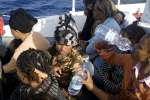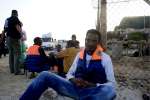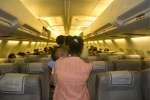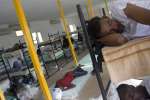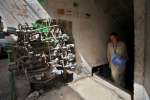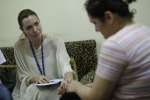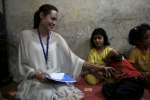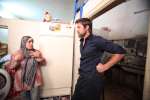- Text size
 |
|  |
|  |
| 
- عربي
Loss of hope and deepening poverty driving Syrians to seek refuge in Europe
News Stories, 25 September 2015
GENEVA, Sept 25, (UNHCR) – The UN refugee agency today identified loss of hope and appalling living conditions as major factors behind the recent spike in the number of Syrian refugees from the region seeking asylum in Europe.
Around four million Syrian refugees are currently living in neighbouring countries, but recent months have seen a marked increase in the number of those seeking refuge further afield, notably in Europe.
Amin Awad, Director UNHCR Bureau for Middle East and North Africa, said this was primarily because of a loss of hope of being able to return home and deteriorating living conditions in the countries where Syrian refugees are currently living.
"Refugees face horrible living conditions, and restrictions in the legal regimes for refugees in the countries where they live … When people don't have proper shelter and are living on 45 cents a day of course they want to move," he told a press briefing in Geneva, adding: "Syrians are checking out from the neighbouring countries."
In total, there have now been almost 429,000 asylum applications by Syrians in Europe since 2011, but due to the lack of reception facilities in Europe many of the most recent arrivals have yet to apply.
"Refugees are having to adopt negative survival strategies – like child labour, dropping out of school, begging and survival sex. They need much more support," Awad, who is also the Regional Refugee Coordinator for the Syria Region, said.
"These are societies that put a high value on education and now they are seeing their children out of school."
He stressed the situation would only end when a solution was found for Syria and the region stabilised.
"Syria is burning; towns are destroyed and that's why people are on the move, that's why we have an avalanche, a tsunami of people on the move towards Europe… As long as there's no resolution in Syria and no improved conditions in neighbouring countries, people will move," he told the briefing at the UN's Geneva headquarters.
Based on ongoing monitoring and assessments, surveys, focus group discussions, and daily interaction with refugees in Jordan, Lebanon, Egypt and Iraq, UNHCR has identified seven principal factors behind the latest outflows.
These are:
Loss of hope
With Syria's crisis now into its fifth year and no sign of a solution in sight, hope is dwindling for many refugees. Feelings of uncertainty about the future are compounded by miserable conditions, fuelling a sense of despair and desperation.
High costs of living/Deepening poverty
Refugees in Lebanon cite the high cost of living as a factor in deciding to stay or go.
In Egypt, refugees say it is getting harder to pay rent, manage high levels of indebtedness and afford their basic needs. In Jordan, the inability to provide for one's family was the most common reason cited by people who knew someone who had left.
The cumulative effect of four years in exile with restricted access to legal employment was also said to be taking its toll. In many cases savings are long depleted, precious valuables have been sold off and many refugees across the region live in miserable conditions, struggling to pay rent, feed their families, and cover their basic needs.
Limited livelihood opportunities
Without ability to work, many refugees struggle to make a living. Lack of livelihood opportunities or access to the formal labour market was cited as a problem by refugees in Lebanon, Egypt and Jordan. Syrian refugees in Iraq say the large number of internally displaced people has increased competition for jobs in the Kurdistan region of the country. Meanwhile, work on construction sites in the region has dried up with the drop in oil prices.
The lack of access to legal work leads refugees, desperate to provide for themselves, to resort to informal employment – risking exploitation, working in unsafe conditions or having payment withheld by unscrupulous employers. If caught working illegally, some refugees face sanctions, for example in Jordan being returned to a camp. Under new regulations in Lebanon, refugees must sign a pledge not to work when renewing their residency status.
Aid shortfalls
Aid programmes for refugees and host communities in the region have been plagued by chronic funding shortages. The current inter-agency Syrian regional refugee and resilience (3RP) plan for 2015 is only 41% funded, which has meant cuts in food aid for thousands of refugees, and those that get it having to survive on US$0.45-0.50 a day. Many refugees in Jordan told UNHCR the WFP food aid cuts were the last straw in their decision to leave the country. Tens of thousands miss out on cash assistance, sinking deeper into debt. As a result people resort to negative coping strategies – including begging, child labour, and increased indebtedness. Shrinking humanitarian aid was cited by refugees in Iraq, Jordan, Lebanon and Egypt as cause of desperation and a driver of onward movement.
In Jordan, inadequate funding has seen refugees losing free access to healthcare. As a result, 58.3 per cent of adults with chronic conditions do without medicine or health services, up from 23 per cent in 2014. There is also a marked decrease in access to curative and preventative health care.
Hurdles to renew legal residency
In Lebanon, new regulations for Syrian refugees have made it harder for Syrians to access asylum, and increasingly Syrians transit through Lebanon to Turkey. Refugees already in the country must pay US $200 per year to renew their stay. They are required to sign a pledge not to work and they must present a certified lease agreement. Many refugees are fearful of arrest or detention and feel vulnerable because of lapsed residency visas.
In Jordan, an urban verification exercise launched by the authorities in February to ensure that all Syrians residing outside of camps are issued with a new identity document to access services presents a number of challenges. The cost of obtaining a health certificate as part of the process can be prohibitive.
Scant education opportunities
Limited education opportunities were cited as a problem for refugees in Jordan, Egypt, Lebanon and Iraq. Education is highly valued among Syrians, who enjoyed free and mandatory schooling at home before the war. The worsening conditions that refugees face in exile are having a devastating impact on the education of refugees. In Jordan, some 20 per cent of children are abandoning school in order to work and in some cases girls are being forced into early marriage. Some 90,000 Syrians of school age have no formal education, with 30,000 of those accessing informal education and the rest missing out completely.
In Lebanon, where education is free to Syrians in a two-shift system, many children struggle to attend while at the same time working to support their families. While the Ministry of Education has increased by 100 per cent the number of places for Syrian children (that is, 200,000 in the 2015/2016 school year), another 200,000 Syrian children will be out of school this year.
Across the region, Syrian youth are missing out on tertiary education and losing hope about their future.
Feeling unsafe
The majority of displaced Iraqis, UNHCR spoke to who were travelling outside Iraq reported feeling unsafe in the country. Many people from minority groups have told UNHCR they see migration as the key to their physical safety.
The information gathered mainly applies to Syrians living as refugees in the region, but also overlaps with internally displaced people in Iraq and Syria.
By Ariane Rummery, Geneva

























